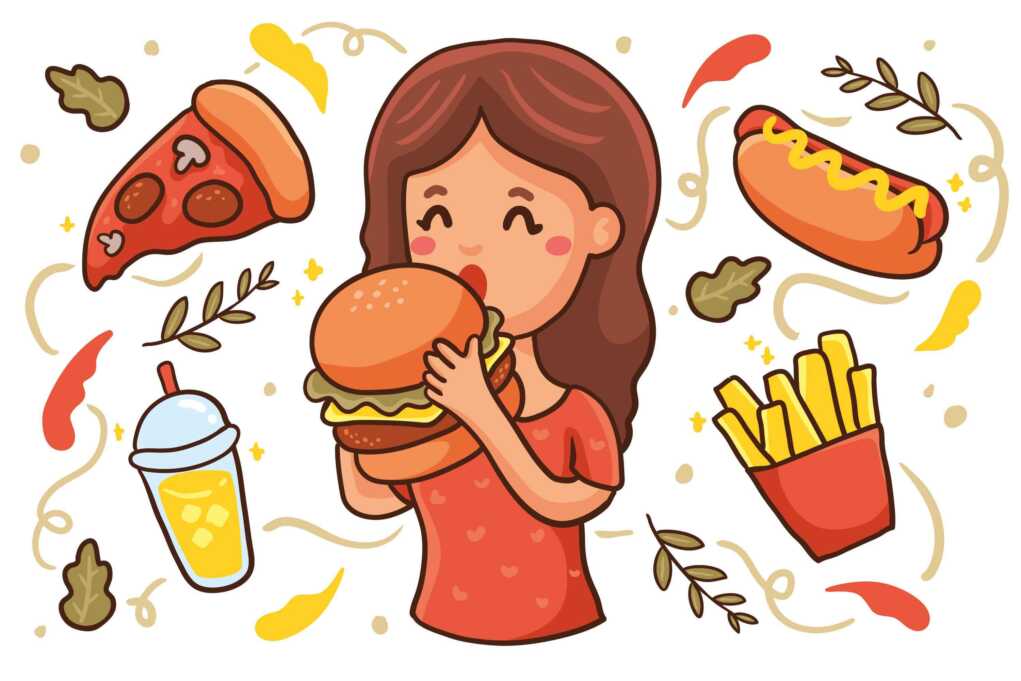
Junk food is a term that’s commonly used to describe ultra-processed foods and drinks, like fast food, soda, candy, cookies, and salty snack foods. These foods make up a large portion of most people’s diets. In fact, some study findings suggest that junk food accounts for nearly 50% of the average American’s daily calorie intake.1
While there’s nothing wrong with enjoying your favorite foods from time to time—like baked goods, ice cream, and chips—junk food shouldn’t be a regular part of your diet, since consuming it too often can harm your physical and mental health.2
For example, diets high in junk food are associated with conditions such as obesity, fatty liver, high blood sugar, depression, heart disease, and certain cancers.34
If your diet is currently high in junk food and you’re trying to kick your junk food habit for good, there are several effective methods to try.
Here are 9 evidence-based tips that can help you eat less junk food.
1. Cook More Meals at Home
Making an effort to cook more meals at home is one of the best ways to cut back on junk food. Oftentimes, people choose convenience foods, like sweetened coffee drinks, donuts, and fast food, when they’re on the go and have no other meal or snack options.
Cooking more at home, including meal prepping, can help decrease your reliance on convenience foods and ensure you always have a healthy meal or snack on hand. Multiple studies have found that people who cook more have better quality diets, including greater intake of fruits and vegetables and less fast food consumption, as well as lower obesity rates compared to people who frequently dine out. Plus, they tend to spend less money on food.5
If you’re not used to cooking meals at home, start slow by preparing one or two meals a week at home and then increasing your at-home meal prep from there.
2. Eat More Protein
Protein is the most satiating nutrient and has a powerful effect on your food intake and food choices. Studies show that increasing your protein intake is an effective way to cut back on snacking and prevent overeating, which may help you reduce your junk food intake.6
Some research suggests that cutting back on carbs and replacing carbs with sources of fat and protein can help reduce food cravings as well as overall calorie intake. A small 2019 study that included 19 people found that following a higher protein, lower carb diet that consisted of 14% carbs, 58% fat, and 28% protein for four weeks significantly reduced food cravings, including cravings for sweets and fast food.7
The researchers also found that following this diet helped improve dietary restraint while reducing hunger and disinhibition, which refers to a loss of control when eating and a tendency to overeat in the presence of highly palatable foods, like junk food.
3. Fuel Your Body Regularly
Depriving your body of calories or being overly restrictive with your food intake may seem like an effective way to promote weight loss or prevent junk food intake, but it can actually have the opposite effect.
Though the relationship between calorie restriction’s impact on cravings and calorie intake is complex, some research shows that skipping meals and depriving your body of certain foods could increase cravings and snacking.
For example, a 2020 review found that interventions that included total avoidance of certain foods increased cravings for the foods that were off-limits. Additionally, some studies suggest that skipping meals, like breakfast, may increase cravings for carb-rich foods at night.89
While everyone has different calorie and meal timing needs, in general, following a meal plan that consists of regular, nutrient-dense, protein-rich meals and snacks could help you maintain a healthy calorie intake and reduce your cravings for junk food.
4. Eat More Filling Foods
If you’re struggling with your diet and food choices, learning more about how certain foods impact your body and hunger levels may help you develop a healthier eating plan and cut back on your junk food intake.
Most junk foods are high in calories yet low in satiating nutrients, such as fiber, protein, and healthy fats. Protein and fiber are especially important for satiety, as they help your body feel full after eating.6,10
Instead of reaching for junk foods, like a donut and sugary coffee drink on your way to work, take a moment to think about what your body needs and how that meal will impact your blood sugar, hunger levels, and mood. Choosing a higher-protein, higher-fiber breakfast, such as egg bites and a side of fruit with an unsweetened coffee, will help you feel much fuller after eating, which may help prevent junk food cravings later in the day.
5. Get Enough Sleep
Sleep is essential to health, and depriving your body of quality sleep can negatively impact your food choices and increase your desire for junk food.
Studies show that lack of sleep and disturbed sleeping patterns can increase overall calorie intake, snacking, and cravings for foods high in carbs and fat, such as junk food.11
Unfortunately, just one night of poor sleep can affect your food choices the next day. A 2019 study that included 24 women found that when their time in bed was reduced by 33%, which translates to a two to three-hour sleep reduction, the women reported increased hunger and food cravings compared to a normal night’s sleep. The sleep reduction was also associated with an increased desire for chocolate and larger portion sizes.12
In order to promote and protect overall health, the National Sleep Foundation recommends that adults get between seven to nine hours of sleep per night.13
6. Manage Your Stress
Stress can take a significant toll on your physical and mental health and can even impact your food choices. While it’s impossible to avoid all forms of stress, developing healthy stress management practices could help you cut back on your junk food intake.
Chronic stress has been shown to influence hormones that regulate eating behaviors and food choices, such as cortisol.14
Interestingly, during acute or short-term stress, your appetite is usually suppressed. However, studies show that chronic stress generally promotes increased cravings and intake of highly palatable foods, such as junk food.15
A 2021 study that included data on 1,270 adults found that the participants with higher perceived stress levels reported higher rates of ultra-processed food consumption. The study showed that people with high stress levels were nearly two times as likely to have higher ultra-processed food intake compared to those with low stress levels.16
Lopes Cortes M, Andrade Louzado J, Galvão Oliveira M, et al. Unhealthy food and psychological stress: the association between ultra-processed food consumption and perceived stress in working-class young adults. Int J Environ Res Public Health. 2021;18(8):3863. doi: 10.3390/ijerph18083863.
Meditation, exercise, therapy, and spending more time outside are just a few examples of evidence-based ways to reduce stress.
7. Consider Overhauling Your Pantry
If your kitchen is stocked with junk food, you may want to consider swapping out ultra-processed products for more nutritious options. Keeping highly palatable, easy-to-overeat junk food in your kitchen can lead to excessive snacking and calorie intake, which can negatively impact health in several ways.
Research shows that even looking at tempting foods can stimulate an area of the brain called the striatum, which regulates appetite and reward from food intake. This means that having highly palatable foods within eyesight, such as candy, chips, and cookies, may lead to snacking and overeating, even when you’re not necessarily hungry.17
While there’s nothing wrong with occasionally enjoying a sweet or salty treat, if you want to cut back on your junk food intake, it’s best to avoid purchasing junk food and instead fill your kitchen with nutrient-dense products. For example, instead of keeping candy on your counter, try stocking up on fresh fruit for a naturally sweet snack option.
8. Don’t Start Restrictive Diets
Following unnecessarily restrictive diets isn’t good for overall health and can negatively impact your relationship with food. Following ultra-restrictive diets can lead to a harmful cycle of weight loss and regain, commonly known as yo-yo dieting. Not only is yo-yo dieting linked to increased weight gain over time, but it’s also associated with a higher risk of health conditions such as diabetes, high blood pressure, and metabolic syndrome.18
What’s more, most fad diets are ultra-restrictive and involve hard rules such as complete avoidance of added sugar or significant carbohydrate reduction. Strict avoidance of specific foods and designating certain foods as “off limits” can increase cravings for those foods, which can lead to overeating and a generally unhealthy relationship with food.8
No matter if you’re trying to lose excess body weight or simply trying to clean up your diet, there’s usually no need to follow a very restrictive eating pattern. Instead of trying out the newest fad diet, try transitioning to a more nutritious, well-rounded eating pattern that’s linked with positive health outcomes, such as a Mediterranean-style diet or a plant-centric diet. These eating patterns don’t involve strict food rules, rather they prioritize foods known to support fullness and decrease cravings, such as protein-rich legumes and seafood, and fiber-rich vegetables.
9. Grocery Shop Regularly
Having a well-stocked kitchen makes it easier for you to prepare more meals at home and can help you eat less junk food.
Studies show that people who grocery shop more frequently have better quality diets compared to people who don’t, including lower intakes of ultra-processed food.19
If you have trouble staying on track when grocery shopping, or simply don’t know what to buy, consider making a grocery list. Not only can making a grocery list help you avoid impulse purchases, like junk food, but it can also help you build a healthier diet overall. A well-rounded shopping list should include a variety of nutritious foods, such as fresh and frozen fruits and vegetables, nuts and seeds, canned and dried beans, and protein options, like poultry, fish, or tofu.20
Having healthy groceries on hand can motivate you to prepare healthy meals and snacks for the week ahead, which can help you eat less junk food.
A Quick Review
Junk food makes up a large portion of the average American’s dietary intake. Eating junk foods, such as candy, soda, and sugary baked goods, too often can harm health, which is why it’s best to limit junk food intake as much as possible.
If your current diet is high in junk food, there are ways to help you cut back, such as cooking more meals at home, increasing your protein intake, choosing more filling foods, and managing your stress levels.
While it’s usually not necessary to completely avoid junk food, following a diet that prioritizes foods associated with positive health outcomes, such as fiber-rich produce and satiating protein sources, can help you make healthier choices, such as cutting back on junk food.
Source:
- Dunford EK, Popkin B, Ng SW. Junk food intake among adults in the united states. J Nutr. 2021;152(2):492-500. doi: 10.1093/jn/nxab205.
- Dinu M, Martini D. Ultra-processed foods, diet quality and human health. Nutrients. 2023;15(13):2890. doi: 10.3390/nu15132890.
- Zhang T, Song SS, Liu M, Park S. Association of fried food intake with gastric cancer risk: a systemic review and meta-analysis of case-control studies. Nutrients. 2023;15(13):2982. doi: 10.3390/nu15132982.
- Yang B, Glenn AJ, Liu Q, et al. Added sugar, sugar-sweetened beverages, and artificially sweetened beverages and risk of cardiovascular disease: findings from the women’s health initiative and a network meta-analysis of prospective studies. Nutrients. 2022;14(20):4226. doi: 10.3390/nu14204226.
- Klein L, Parks K. Home meal preparation: a powerful medical intervention. Am J Lifestyle Med. 2020;14(3):282-285. doi: 10.1177/1559827620907344.
- Moon J, Koh G. Clinical evidence and mechanisms of high-protein diet-induced weight loss. Journal of Obesity & Metabolic Syndrome. 2020;29(3):166. doi: 10.7570/jomes20028.
- Anguah KOB, Syed-Abdul MM, Hu Q, et al. Changes in food cravings and eating behavior after a dietary carbohydrate restriction intervention trial. Nutrients. 2019;12(1):52. doi: 10.3390/nu12010052.
- Meule A. The psychology of food cravings: the role of food deprivation. Curr Nutr Rep. 2020;9(3):251-257. doi: 10.1007/s13668-020-00326-0.
- López-Gil JF, Sánchez-Miguel PA, Tapia-Serrano MÁ, García-Hermoso A. Skipping breakfast and excess weight among young people: the moderator role of moderate-to-vigorous physical activity. Eur J Pediatr. 2022;181(8):3195-3204. doi: 10.1007/s00431-022-04503-x.
- Akbar A, Shreenath AP. High fiber diet. In: StatPearls. StatPearls Publishing; 2023.
- Papatriantafyllou E, Efthymiou D, Zoumbaneas E, Popescu CA, Vassilopoulou E. Sleep deprivation: effects on weight loss and weight loss maintenance. Nutrients. 2022;14(8):1549. doi: 10.3390/nu14081549.
- Yang CL, Schnepp J, Tucker RM. Increased hunger, food cravings, food reward, and portion size selection after sleep curtailment in women without obesity. Nutrients. 2019;11(3):663. doi: 10.3390/nu11030663.
- National Sleep Foundation. How much sleep do you really need?
- Chao A, Grilo CM, White MA, Sinha R. Food cravings mediate the relationship between chronic stress and body mass index. J Health Psychol. 2015;20(6):721-729. doi: 10.1177/1359105315573448.
- Chao AM, Jastreboff AM, White MA, Grilo CM, Sinha R. Stress, cortisol, and other appetite-related hormones: Prospective prediction of 6-month changes in food cravings and weight. Obesity (Silver Spring). 2017;25(4):713-720. doi: 10.1002/oby.21790.
- Lopes Cortes M, Andrade Louzado J, Galvão Oliveira M, et al. Unhealthy food and psychological stress: the association between ultra-processed food consumption and perceived stress in working-class young adults. Int J Environ Res Public Health. 2021;18(8):3863. doi: 10.3390/ijerph18083863.
- Seabrook LT, Borgland SL. The orbitofrontal cortex, food intake and obesity. J Psychiatry Neurosci. 2020;45(5):304-312. doi: 10.1503/jpn.190163.
- Rhee EJ. Weight cycling and its cardiometabolic impact. J Obes Metab Syndr. 2017;26(4):237-242. doi: 10.7570/jomes.2017.26.4.237.
- Banks J, Fitzgibbon ML, Schiffer LA, et al. Relationship between grocery shopping frequency and home- and individual-level diet quality among low-income racial or ethnic minority households with preschool-aged children. J Acad Nutr Diet. 2020;120(10):1706-1714.e1. doi: 10.1016/j.jand.2020.06.017.
- Dubowitz T, Cohen DA, Huang CY, Beckman RA, Collins RL. Using a grocery list is associated with a healthier diet and lower bmi among very high-risk adults. J Nutr Educ Behav. 2015;47(3):259-264. doi: 10.1016/j.jneb.2015.01.005.
Important Notice: This article was also published at www.health.com by Jillian Kubala, RD where all credits are due. Medically reviewed by Kayla Girgen, RD
Disclaimer
The watching, interacting, and participation of any kind with anything on this page does not constitute or initiate a doctor-patient relationship with Dr. Farrah™. None of the statements here have been evaluated by the Food and Drug Administration (FDA). The products of Dr. Farrah™ are not intended to diagnose, treat, cure, or prevent any disease. The information being provided should only be considered for education and entertainment purposes only. If you feel that anything you see or hear may be of value to you on this page or on any other medium of any kind associated with, showing, or quoting anything relating to Dr. Farrah™ in any way at any time, you are encouraged to and agree to consult with a licensed healthcare professional in your area to discuss it. If you feel that you’re having a healthcare emergency, seek medical attention immediately. The views expressed here are simply either the views and opinions of Dr. Farrah™ or others appearing and are protected under the first amendment.
Dr. Farrah™ is a highly experienced Licensed Medical Doctor certified in evidence-based clinical nutrition, not some enthusiast, formulator, or medium promoting the wild and unrestrained use of nutrition products for health issues without clinical experience and scientific evidence of therapeutic benefit. Dr. Farrah™ has personally and keenly studied everything she recommends, and more importantly, she’s closely observed the reactions and results in a clinical setting countless times over the course of her career involving the treatment of over 150,000 patients.
Dr. Farrah™ promotes evidence-based natural approaches to health, which means integrating her individual scientific and clinical expertise with the best available external clinical evidence from systematic research. By individual clinical expertise, I refer to the proficiency and judgment that individual clinicians acquire through clinical experience and clinical practice.
Dr. Farrah™ does not make any representation or warranties with respect to the accuracy, applicability, fitness, or completeness of any multimedia content provided. Dr. Farrah™ does not warrant the performance, effectiveness, or applicability of any sites listed, linked, or referenced to, in, or by any multimedia content.
To be clear, the multimedia content is not intended to be a substitute for professional medical advice, diagnosis, or treatment. Always seek the advice of your physician or other qualified health providers with any questions you may have regarding a medical condition. Never disregard professional medical advice or delay in seeking it because of something you have read or seen in any website, video, image, or media of any kind. Dr. Farrah™ hereby disclaims any and all liability to any party for any direct, indirect, implied, punitive, special, incidental, or other consequential damages arising directly or indirectly from any use of the content, which is provided as is, and without warranties.








